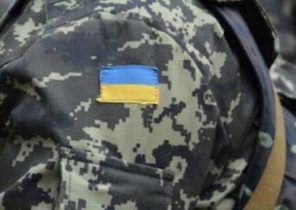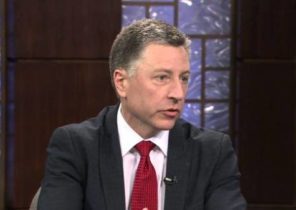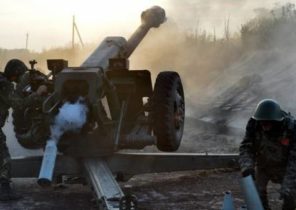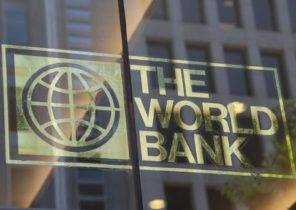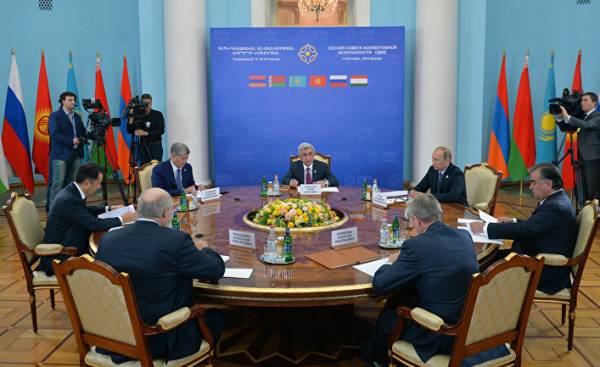
It’s been more than a quarter of a century since, between Yerevan and Moscow established diplomatic relations. Today, the Russian-Armenian relations, as stated at the highest level, have the character of strategic partnership. It is obvious that the partnership can be considered effective if it meets the interests of both parties not less obvious also the fact that, despite the strategic partnership that Russia, like any other country, tries first and foremost to promote and protect its national interests. To the relationship with Moscow to Yerevan zero-sum game, it is necessary to convey to the structures of power in the Kremlin clearly articulated Armenian interests and “red lines” that can not move. In this regard, become topical issues of effective cooperation with Russia and searching for working mechanisms to influence foreign policy decisions of Moscow concerning the South Caucasus region.
Of course, the main and the main bilateral cooperation mechanism is a direct relationship at different levels of government (summit meetings, telephone conversations between heads of state, mutual visits of foreign Ministers and officials of different rank, the functioning of diplomatic missions and so on). To work effectively with Russia to Armenia in the first place, you need a strong diplomatic resources.
In other words, Armenia needs of embassies and consulates, through which will be possible in a timely manner to convey to decision makers in the Kremlin, Armenia’s position on important issues. Today in the expert community is dominated by the view that the activity of diplomatic representations of Armenia in Russia is inefficient and does not meet current realities. The vivid proof of that are the events of April 2016, when the Armenian diplomatic mission kept silence and was impermissible passive.
Public diplomacy
In the absence of sufficiently effective diplomatic missions to Armenia as an important tool of influence can be public diplomacy. In this direction, Yerevan, firstly, the need to develop tools of information influence on public opinion in Russia, by strengthening of the Russian-speaking Armenian media, expressing the Armenian position on all important issues, and create new resources. Secondly, it is necessary to establish the national Armenian Fund, which has branches in Russia, to Finance the support of the Armenian and Russian public organizations, scientific-analytical centers and young scholars studying relevant for Armenia problems. Such funds exist in many countries, including Russia, and in the case of adequate public funding they can be a valuable foreign policy tool in the hands of Russia.
In addition, the need to support representatives of the Armenian origin that are active in socio-political sphere and in the media arena. Through them, it will be possible the formation of public opinion and a certain discourse on the necessary agenda. In this context, the work with the Russian media should be one of the key directions of Armenia and the Armenian groups in Russia. Publication in the leading Russian mass media, as well as participation in rating television programs will allow to form the corresponding Armenian interests to the agenda, to convey the Armenian point of Zrenjanin decision-makers, in particular, not by the mouth of the Armenians.
The promotion of “their own” candidates to the State Duma of Russia
In addition to public diplomacy, Armenia should fully use the Armenian factor in Russia, with the aim of protecting state interests. Russia is home to the largest Armenian community, which, according to the latest census, has a population of 1 million of 182, 4 thousand people. These figures do not fully reflect the reality, as is commonly believed, that in fact Russia is home to 2.5 million Armenians, which is a potential tool to influence foreign policy decisions of Russia. In addition to significant size, for Armenia is a great resource also compact residence of Armenians in the Krasnodar and Stavropol edges and the Rostov region. In these regions of the Armenian community have considerable influence and social weight.
This factor is not used fully, as evidenced by the absence of Russian citizens of Armenian nationality in the state Duma and limited representation in regional legislative bodies. For effective use of the Armenian resources in Russia should contribute to the promotion of Russian citizens of Armenian origin in the structures of power in Russia.
This requires active engagement with the major political parties and funding election campaigns of candidates of Armenian origin. Of course, one should not idealize the influence of ethnic groups on political decision-making in Russia, however, in the face of Armenian MP, Armenia, as a country, will get a direct lobbyist, who, if necessary, can become a channel of communication and to deliver the position of Yerevan decision makers in the Kremlin, and Vice versa — to transfer the signals from Moscow to the Armenian authorities.
The non-defensive lobbying
Unlike the USA and the European Union, where lobbying is a legitimate activity and has a regulatory framework in Russia, he is not a clear legal regulation. This is essentially why the term “lobbying” itself in the modern Russian reality has negative overtones and is often associated with corruption schemes. Despite this, lobbying in Russia is still there and is a fairly effective tool for pressure groups.
Historically the object of lobbying in Russia was a monarchy, in whose hands was all the power is centralized, and lobbyists have been either his associates or minions, who had a certain status or “reach to the body.” Today, despite the fact that the 10th paragraph of the Russian Constitution strengthens the principle of separation of legislative, Executive and judicial authorities, almost all important decisions are taken by the President or with his consent.
In this system, the role of lobbyists are carried out by deputies of Federal and regional levels, senators, officials of different ministries and departments, employees of the presidential administration, government or other agencies that have powers. Armenia and the Armenian pressure groups in Russia in the first place, should work with such people to reach out to the President and to try to influence the process of making important for the Armenian state policy decisions. At the same time, work with the host in Russia, decision-makers should not be situational, and coordinated, allowing time to bring our own position and to prevent possible negative consequences.
Voice of Armenia in international organizations
In international organizations a choice position in the voting on the sensitive issues of Armenia should be based solely on national interests and ignore the offers of third parties. However, to maintain positive relations with Russia, the Armenian side can afford to support strategic ally in principle for him and not very important issues. In this regard, the view expressed by the representatives of States to international organizations should not be dictated by the interests of a third party, since it is necessary to consider possible risks to sensitive for Armenia issues.
In this context, a relevant example is the UN vote on the issues of return of refugees to Abkhazia and South Ossetia. Against this initiative voted 14 countries, including with Armenia and Russia were Belarus, Burundi, Cuba, Laos, Nauru, Nicaragua, South Sudan, Syria, Venezuela, Vietnam, Zimbabwe and other countries. As countries in Latin America, Africa and South Asia do not have Georgia common border and political relations at the highest level, this agenda for them was not fundamental, therefore, these countries on a mutually beneficial basis to support the party. Armenia, in turn, is in a completely different position, and voting has certain political risks.
In this case, for Armenia the best choice would be to abstain from voting, as did a third of all member countries of the UN General Assembly. It would be wrong to assume that the Yerevan vote, purely guided by its national interests, speaking against its neighbor in the international arena on a point of principle for him to question. This format of relations between Russia and Armenia, where Yerevan makes concessions on sensitive issues, will have a destructive influence on Armenia’s relations with third countries in the case of negative position of Yerevan in matters relating to their partners.
For cooperation with Russia Armenia today there are at least two international areas, where Armenia has significant institutional presence, such as the CSTO and the EAEC. The appointment of Tigran Sargsyan and Yuri Khachaturov, respectively, the positions of Chairman of the Board of the Eurasian economic Union and the CSTO Secretary General, is an important policy tool, in terms of conveying the positions of Armenia to the allied military bloc and partners in economic integration.
Is a report their own principled positions on important issues to those allies and partners who often do not hide their sympathy for Azerbaijan and directly support it, is the first step towards the establishment of mutually beneficial relations with the countries-members of the EAEC and the CSTO. For example, from this point of view Armenia should have withdrawn from participation in the EAEC summit, which was moved from Yerevan to Moscow in connection with the escalation of the Karabakh conflict in April 2016. The failure of the partners from participation in a pre-prepared summit in the capital of the participating countries undermined the spirit of integration. However, the fact that Armenia has agreed to participate in the postponed summit partners is perceived as a sign not of principle.
Hard positioning on the basis of national interests must be of a periodic nature. The need for a clear designation of “red lines” should be a guarantee of the preservation of alliances and partnerships. In the absence of such requirements, the perception of the partners will match it.
Military base in Gyumri
The presence of Russian military base in Gyumri is an important strategic factor for Armenia and for Russia. In a rapidly changing middle East, where relationships are temporary situational, impossible to make long-term bets on allied relations with any of the players. Now these points are base in Hemami and item of food logistics in Tartus, which is going to modernize and transform into a full-fledged military base. In spite of this, a base in Gyumri remains important for Russia a “window” in the middle East. The existence of an appropriate legal base between Armenia and Russia, the continued economic and military integration are the guarantee of long-term Russian stay in an unstable region.
Further strengthening the role of Moscow in the middle East, its military presence between the two key regional players such as Turkey and Iran, is becoming increasingly urgent. Moreover, the military presence at the Christian country that does not actively participate in the regional processes, is not broken between informal alliances (what can we say about Syria), gives a great superiority of Russia. In addition, the presence legitimate in the eyes of the international community, because military bases in Abkhazia and South Ossetia as the territories of the unrecognized state formations, illegal from the point of view of international law.
This suggests that Armenia should turn the Russian presence on its territory of a political asset to be used as in the bilateral relations, and foreign policy in General. Today, the Russian-Armenian relations in this context appear one-sided way with the Russian movement. To create the balance necessary to a military base is a key factor in its hands to influence Russia. This can be achieved through diversification of military cooperation that will allow to balance political and military influence of Moscow, thus creating a field for foreign policy maneuvering. Obviously, this would meet opposition from Moscow, and at the moment it is necessary to form state political demands for dividends.
Thus, Armenia’s policy towards Russia should be based solely on national interests. Format of bilateral relations with a zero amount is destructive and contains political risks. Today, Armenia has all the necessary mechanisms for the formation and preservation of balanced relations with Russia. With adequate political will and efficient use of the whole complex of arrangements Armenia will be able to achieve real, not declared, strategic alliances.
***
Van Harutyunyan, analyst, Deputy head of the scientific-analytical center “The Armenian Interest” (Վան Հարությունյան, վերլուծաբան, “The Armenian Interest” գիտավերլուծական կենտրոնի ղեկավարի տեղակալ).
Sergey Melkonyan, editor in chief of scientific-analytical centre “The Armenian Interest”, the head of the analytical portal “International Studies” (Սերգեյ Մելքոնյան, “The Armenian Interest” գիտավերլուծական կենտրոնի գլխավոր խմբագիր, International Studies վերլուծական պորտալի ղեկավար).
